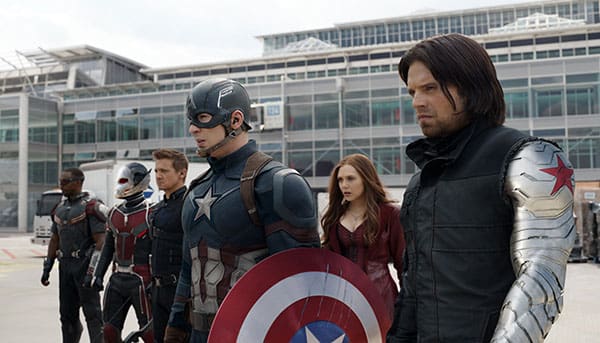The saga comes to a close. We’ve watched Steve fight Nazis, Steve fight modern Nazis, and finally, in Captain America: Civil War, we see Steve fight his friends (and another Nazi). While Civil War is my least favourite of the trilogy, it is still an excellent and engaging piece of cinema.
While it contains the least Captain America of any film, it thrives as an ensemble piece. The whole gang’s here (and I really mean it). Black Panther makes his first appearance, Scarlet Witch comes along from Age of Ultron, Scott Lang (Ant Man) joins in on the fun, and Spiderman, in a move that was significant not only to the MCU but to the MMU (Media Monopoly Universe), swings into frame. To focus on the main cast, Steve seems thoroughly defeated in this film. The events of Civil War only reinforce the doubts presented to him by The Winter Soldier: the world is very different today than it was in 1939. Nevertheless, his loyalty shines through more than ever, as his dedication to Bucky and his well-being is really the driving force behind much of the film’s narrative. Steve’s presence in Civil War is just another reminder that Chris Evans was a stellar casting choice from Marvel. He plays tired and downtrodden just as well as he plays boyish and charming.
However, this film is just as much about Tony Stark as it is about Steve Rogers. Steve’s loyalty to Bucky, and Tony’s unprocessed grief over the loss of his parents, are what spark the titular civil war. Tony, like Steve, is also at the end of his tether. Following the incident at the Wakandan embassy, Tony really has no faith in the independent operation of the Avengers. Fresh from the events of The Winter Soldier (and compelled by his dedication to Bucky), Steve, naturally, thinks otherwise.
It’s a clash of titans! Tony, Steve, and Bucky are really the standouts, with very strong performances from Downey, Evans and Stan. But the whole team is a delight — seeing Tom Holland’s Spiderman for the first time was an absolute pleasure, and watching Ant-Man become Giant-Man was a highlight for many members of the audience. Of all the franchise character films, this is the closest we get to another Avengers film — it is truly an ambitious crossover.
For the first time, we see the consequences of heroic action. Civil War is all about the past coming back to haunt those in the present. Bucky and Sokovia make the MCU feel truly connected, not only aesthetically, but also consequentially. The actions of the Avengers carry over from the films of MCU past and play an active role in shaping the narrative and outcomes of Civil War. In many ways, Civil War was the end of a phase in and of itself. It ties together a number of unresolved arcs and brings them together in a way that is satisfying and sensible. While the Avengers films excellently present world-shattering and universe-ending storylines, sometimes it’s nice to have a larger crossover movie be a little more down to earth. And boy is Civil War down to earth. This is almost an entirely character driven storyline and it shows. That’s what makes it such a good ending to one of the best character sagas in the MCU. Of all of them, the Captain America trilogy is the most cogent and the most consistent. Its themes never waver and the relationship between Steve and Bucky is always center stage.
Since this will be my final review of the Captain America franchise, I should try and say everything I want to say. So I will. The relationship between Steve and Bucky should have, and could have, been romantic, whether from before Bucky’s fall into the German crevasse, or after his deprogramming following Civil War. If I have one complaint about the trilogy, it’s that they never took this step. Like Poe and Finn, Disney saw the subtext and said no. This disappointment doesn’t compromise the three films for me (or the ongoing relationship between the two following the conclusion of Civil War), but it does make me think of what could have been. There is often a hesitance to make an established character queer, with most modern franchises opting to introduce someone as gay from go (see The Eternals) rather than work it into an existing storyline. But at some point you’re gonna have to make someone gay, so why not make it now.
Queer themes aside, both Civil War, and the trilogy more broadly, are an achievement in superhero storytelling. They feel real, weighty, and more meaningful than corporate synergy. While not all superhero movies are created equal, Captain America shows that the characters and narratives of comic books are so prolific for a reason: they tell universal stories of love, loss, and above all, life.





